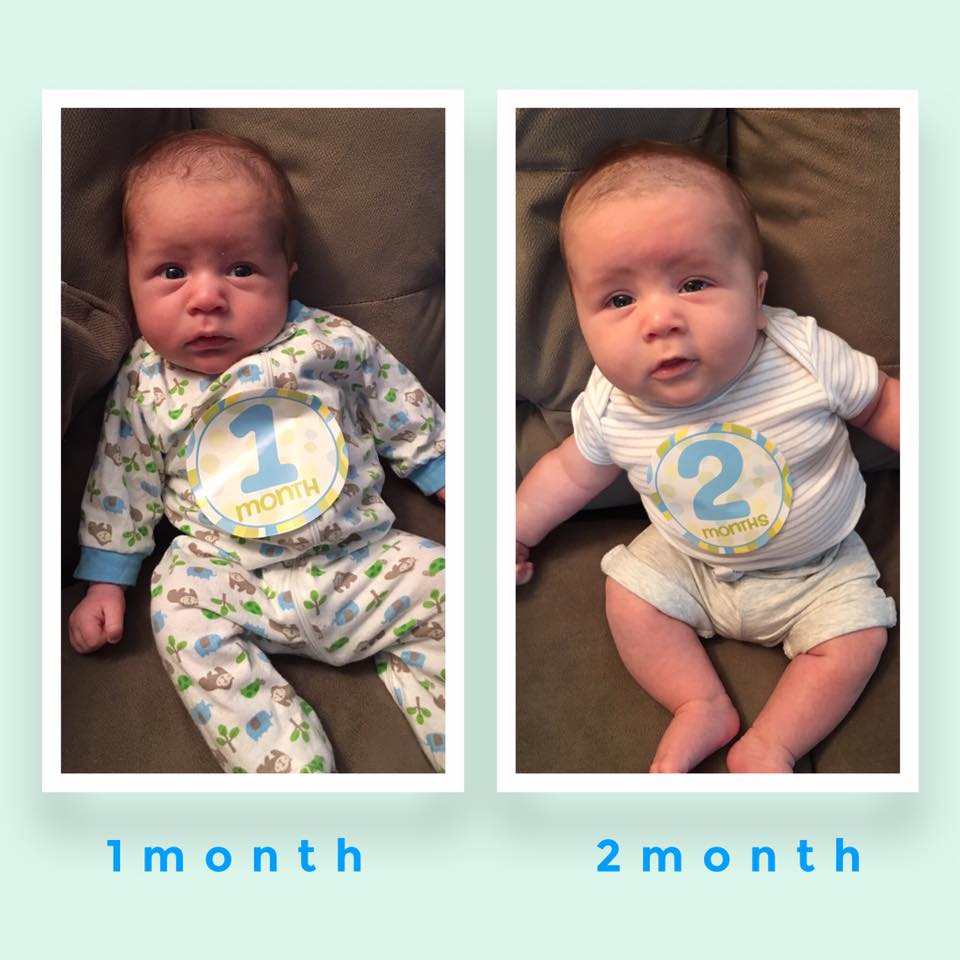Can you overfeed an infant?


For Stacey and I the birth of Erikson has been almost like the birth of a first child. Even though both of us have been through the first years of raising children before, we feel as though we can’t remember any of what went on. Perhaps the sleep deprivation causes memory loss during the early days. Everything seems new, and a lot harder than when we were younger. We think maybe we’re old. 🙂
One of the biggest issues started the first week. Baby Erikson was 6 pounds 14 ounces when he was born on April 22, 2016. We planned to breast feed if possible because of the health benefits, and hey it’d be great to save money on formula and for Stacey to get to burn 500 extra calories a day making milk. Erikson was 6 pounds 4 ounces when he left the hospital. The loss in weight happens because milk takes a few days to come in. Every night was a nightmare. Erikson would scream constantly, and wanted to feed constantly as well. At the Pediatrician they told us he wasn’t gaining weight. We couldn’t figure it out, and so Stacey pumped to see what would come out. We found out why he was hungry because Stacey only got about 1 ounce from each side and when she had been feeding him she’d only have him stay on one side per feeding. We started supplementing based on instructions from the Pediatrician. Then Stacey’s health took a turn for the worst, and she was in the hospital. I had Erikson on my own, and she was now on blood pressure medications that prevented any breast feeding. By his 1 month check-up he had now gained almost 4 pounds in only a couple of weeks of being fed formula. That was when the Pediatrician told us that we were feeding Erikson too much, and had to cut down on formula.
I asked her, “How do we feed him less? We feed him when he’s hungry.” She went on to explain to us how he isn’t really hungry all the time. She explained to us how we don’t try to do other things besides feeding him to calm him. This was the start of my lack of faith in our Pediatrician. Of course I know my baby. I’ve not been away from him for even a single day since he was born. I know his happy noises. I know his sad noises. I know that when he shoves his hand in his mouth and spits out his pacifier that he’s hungry, and I know that he cries a little bit differently when he’s hungry vs. when he’s lonely or in pain. Anyone who is a parent would know these things after one month of being there around the clock. I asked if I should dilute his formula. She said no. I asked if I should let him scream. She said no. I asked for any practical advice about how to “feed him less,” but she had no answer. She told us to stick with 3 ounce bottles, and to spread them out. It was a nightmare when we tried to go to that. He was hungry every 1.5 hours, and screaming constantly for food.
Between the 1 and 2 month visits I had been reading as much as I could about feeding infants to try to make things better. I took advice from all the message boards out there with less authority than articles from the Center for Disease Control and World Health Organizations, but still it can be helpful to get information from the average parent. Everything I read from other parents said that babies will not overfeed even on formula unless they have a health condition causing it, and that you should never feed anything other than breast milk or formula to an infant before 6 months old.
We decided to ignore our Pediatrician about only giving 3 ounce bottles, and we started a log of all feedings so that we could get a picture of how much he eats, and how big the gaps were between feedings. We wanted to see if he tended to eat the same amount of formula every day if we simply fed him when he was hungry. When we started we were giving 4 ounces in each feeding. Things got immediately better compared to 3 ounces that our Pediatrician ordered us to follow. He was waiting 2 hours now between feedings instead of 1.5.
Here is what it looked like in our log when we were feeding him on demand with only 4 ounce bottles when we were just starting to ignore the Pediatrician’s demand that we feed our baby 3 ounce bottles:
1 — 8:00a (2h) - 4 oz.
2 — 10:00a (2h) - 2.5 oz.
3 — 12:45p (2h45m) - 4 oz.
4 — 2:45p (2h) - 4 oz.
5 — 4:45p (2h) - 4 oz.
6 — 6:30p - (1h45m) - 4 oz.
7 — 8:30p (2h) - 4 oz.
8 — 9:30p (1h) - 4 oz.
9 — 11:45p (2h15m) - 4 oz.
10 — 2:00a (2h15m) - 4 oz.
11 — 4:15a (2h15m) - 4 oz.
12 — 6:15a (2h) - 4 oz.
—————
46.5 ounces
This is our log just 5 days later from being consistent in feeding him 4 ounces on demand, and also introducing 6 ounce overnight bottles:
1 — 730a (3h10m) — 4 oz.
2 — 9:30a (2h) — 4 oz
3 — 12:15 (2h45m) — 4 oz.
4 — 3:50 (3h35m) — 4 oz.
5 — 7:05p (3h15m) — 4 oz.
6 — 9:35p (2h30m) -- 4 oz.
7 — 11:00p (1h25m) — 6 oz.
8 — 4:15p (5h15m) - 6 oz.
—————
36 ounces
Having the data is important so that you can see he had 10 ounces less when we fed him how he wanted to be fed. He doesn’t know how to overeat. He just knows that his tummy hurts when it’s empty, and it takes him a certain amount of time to digest all the formula in his tummy.
The 2 month check-up came, and he weighed 14 pounds 1 ounce, and was 22 inches long. I wasn’t able to be at that appointment, but Stacey told me that the Pediatrician was angry. I thought it was interesting that the Pediatrician told Stacey during the appointment that Erikson should only have 36 ounces in a day, and that was exactly what he had on June 23, the day of his appointment. I had forgotten to print the feeding log for Stacey so unfortunately she didn’t have our data for the appointment. Did I mention lack of sleep causes some forgetfulness? Again the Pediatrician repeated her message of “feed him less.” She also told Stacey to put cereal in his bottle to make him have more time between bottles. I wish I was there because feeding infants cereal in their bottle has been shown to be ineffective in even causing infants to sleep for longer periods at night, and what’s more, feeding solids to an infant less than 6 months old has been linked to weight issues later in life.
Parents.com says;
Several studies have proven that filling your baby’s belly with a bit of cereal before bedtime won’t help you avoid night feedings. The American Academy of Pediatrics does not recommend ever putting cereal in a bottle — or introducing your baby to solid foods until around 6 months, when she should be getting all the nutrition she needs from breast milk or formula. What’s more, this practice could put your baby at risk for excess weight gain, because she can wind up getting more calories than she needs, cautions Dr. Tomaselli. “A healthy baby eating a regular diet should be able to sleep through the night on her own by about 6 months.
The Centers for Disease Control says;
Popular reasons for giving solid food to babies before 4 months included “my baby is old enough,” “my baby seemed hungry,” “I wanted my baby to sleep longer at night” and — most alarming to researchers — “a doctor or health care professional said my baby should begin eating solid food.”
The American Academy of Pediatrics says;
Building on prior recommendations for the timing of the introduction of solids, a 2005 American Academy of Pediatrics (AAP) policy statement by the Section on Breastfeeding encouraged delaying the introduction of solid foods (including cereal) until a child is 6 months of age for exclusively breastfed infants and 4–6 months for infants who are formula-fed.
As you might imagine I have completely lost faith in our Pediatrician. Based on this topic alone we are not going to continue to see her. I would advise other parents to read as much as you can from authoritative sources, and also consider what other parents have to say when trying to do the best for your baby. It’s hard taking care of a newborn. Some nights I cry because I’m so tired, but I know it’s only this hard for a short time. It’s been getting easier lately. Feeding is such a major part of infant care that I simply had to write this. Hopefully I can help at least one parent to feed their infant when he or she is hungry, and to not feed their infant any solids including cereal in the bottle until 6 months old. I’m willing to cry at night for 6 months if it means that my baby can life a healthier life. We are going to continue to feed him on demand, and keep a log to see how he is trending.